Image
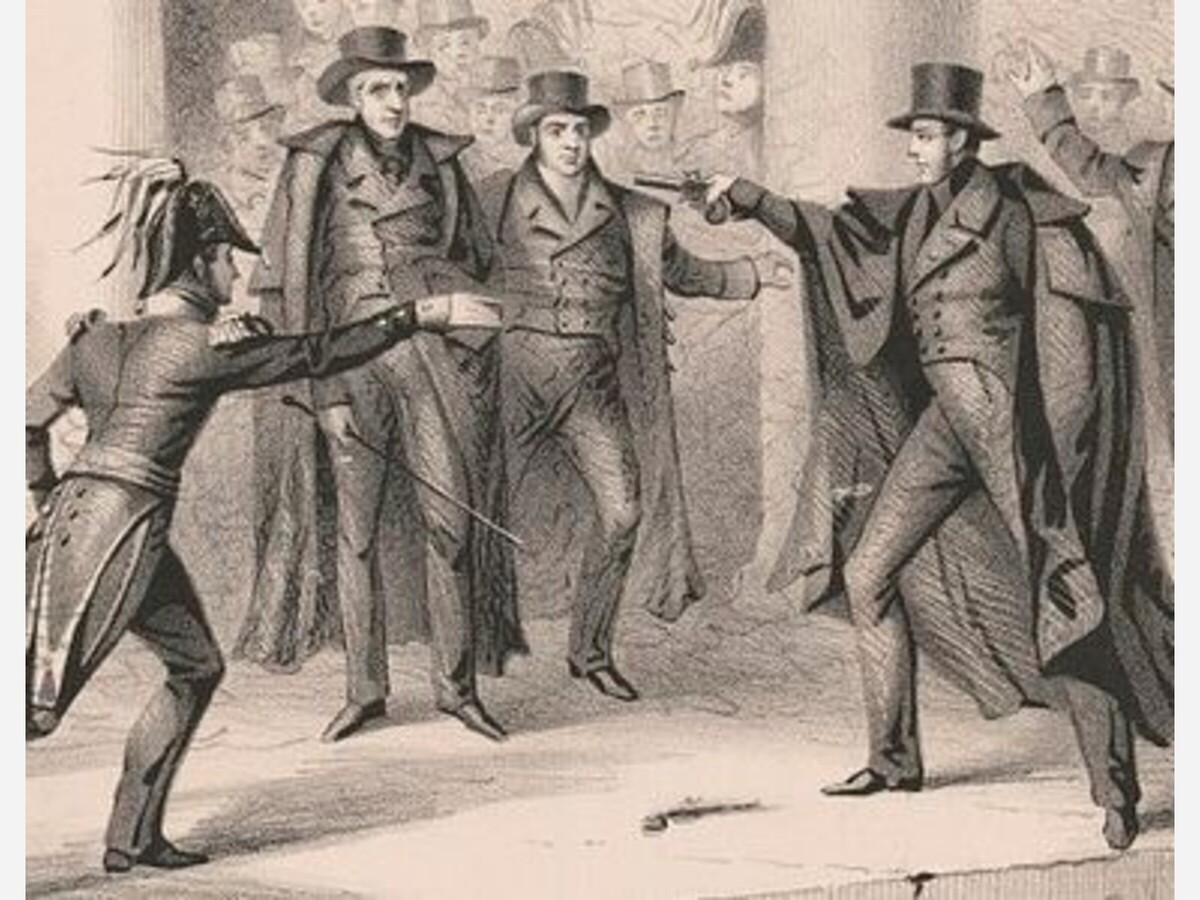
Above, an 1836 engraving illustrating the attempt on the life of Andrew Jackson.
By James C. Johnston, Jr.
How awful! I hate the thought that we cannot resolve our political differences without such violence. I certainly hope that regardless of one’s political outlook reason is not abandoned in favor of a gun. That is a poor way to resolve political differences in a free and democratic society. I was shocked to see that Donald Trump was separated from death by only an inch or two. This is 2024, and this whole incident is unfortunately all too familiar in this nation’s history.
In the 1830s, Andrew Jackson was assaulted by a would-be assassin armed with two pistols which happily both misfired when discharged in his direction. The old hero of the Battle of New Orleans then proceeded to beat his assailant into the ground with his heavy walking stick.
There were plots to kill Abraham Lincoln on his way to his inauguration by a gang of thugs in Baltimore back in March of 1861. Under the urging of the Pinkerton Detectives guarding him, Lincoln disguised himself as a plumber, with the appropriate tool kit, successfully arrived in Washington, then linked up with Congressman Washburn who escorted him to the Willard Hotel in Washington City for safe-keeping until he was inaugurated President on March 4, 1861.

During the Civil War there were several attempts to kill Lincoln as in when he was shot at while returning from the 1860’s version of Camp David, The Soldiers Home, to the Whitehouse. Shots were fired at him as he rode on horseback along the road leading back to Washington. When he arrived home in the city, it was discovered that his tall beaver hat had been shot through only an inch from the top of his head. Plots against the lives of the presidents continued to be formulated with awful results.
It should be noted that back in those days, the Whitehouse was considered to be like any other public building, and people could come to the mansion to ask for political favors, petition for their causes, or just drop in on the president even though they had never previously met him, or ever had a personal relationship with him! Lines of people formed outside of the President’s office, frequently winding down the stairs, waiting to see him as a part of the day’s presidential routine business.
A Tad Too Enterprising
Tad Lincoln, the very enterprising nine-year-old youngest son of the President, decided to charge people waiting in line to see his dad three cents to pay for the privilege of seeing his father, the President, while wearing his custom-made Union soldier’s uniform. Alas, his enterprise was terminated when he was discovered engaging in this particular commerce, much to his regret, because it had been such a lucrative commercial success. Tad was also forced to refund the money that he had collected. In April of 1865, Lincoln himself was assassinated by actor John Wilkes Booth at Ford’s New Washington Theater.
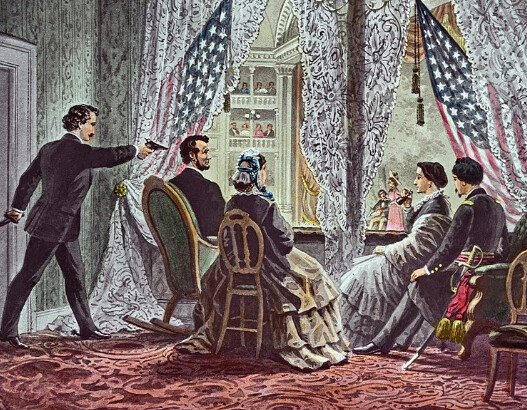
The impact on our history was immediate as it brought the most totally inept, racist, and bigoted individual ever to be president of the United States into office, Andrew Johnson. Johnson was a totally illiterate individual until his former-school-teacher-wife taught him how to read as a young adult. Johnson was a tailor by trade and a politician by choice who eventually became: an elected official, senator, Brigadier General, and Vice President, and successor to Lincoln. As president, he botched the job of post-war reconstruction, was the first president to be impeached, and was openly racist.
Job Seekers and Radicals
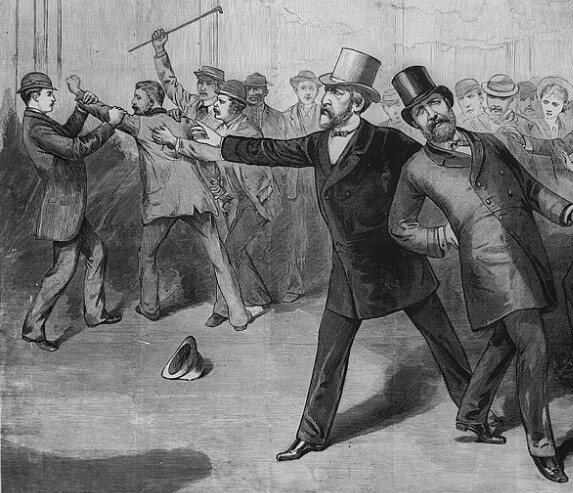
In 1881, reformist Republican President James A. Garfield went to the Pennsylvania Train Station in Washington with Secretary of State James G. Blaine. Once in the station, he was shot in the back by a disappointed office seeker by the name of Charles Guiteau, who wanted to be appointed to the position of Minister [Ambassador] to France. Garfield died many weeks later and Guiteau was tried and hanged for his crime.
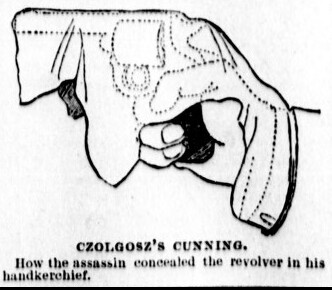
In 1901, William Mc Kinley was assassinated at the Pan-American Exposition in Buffalo, New York. Like Garfield, he lingered for some weeks after being shot and then died of his wound. His killer was a twenty-eight-year old man, named Leon Czolgosz, who was a radical follower of the philosophy of Nihilism. When questioned as to why he shot McKinley, he said, “I didn’t believe that one man should have so much service, and another man have none.” Within fifty-three days of the shooting, Czolgosz was: arrested, tried, found guilty, and hanged.
A Bull Moose Takes a Bullet
In 1912, there were three serious candidates running for the office of President of the United States: William Howard Taft, a very intelligent legal scholar of reforming ambitions who had served the nation in many important offices who was the incumbent Republican President. The Democratic candidate was a very complex man, Woodrow Wilson. Wilson was: an intellectual, reformer Democratic Governor of New Jersey, Former President of Princeton University, an anti-woman’s suffrage personality, and a racist. He was also unbending and incapable of compromise. The great American hero and former Republican President, became the Bull Moose Party, or Progressive candidate.
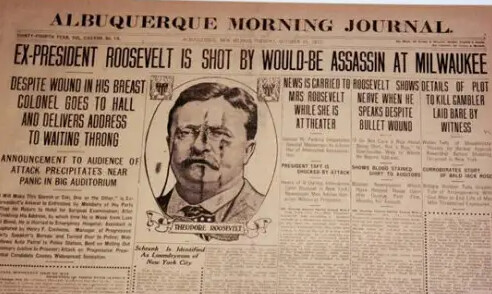
During a well-attended political rally, Teddy Roosevelt was shot in the chest by a would-be assassin. Teddy himself announced the fact to the gathered multitude that he had been shot. After pressing an improvised bandage to the wound which was close to his heart he proceeded to give a speech that lasted one-and-one-half-hours with a bullet in his chest lodged a few inches from his heart. The bullet had been inhibited in its trajectory by Roosevelt’s 50-page speech in his inside coat pocket! Roosevelt went on to place second in the 1912 contest for President. Wilson won the election, and Taft, who would eventually become Chief Justice of the Supreme Court, came in third.
There would be other attempts on the lives of presidential candidates in the years that followed. Franklin D. Roosevelt would survive a gunman’s attempt to kill him in 1933, but the Mayor of Chicago, who was with him, was fatally injured by the gunman. There were other less serious plots which followed which were never carried out.
Presidential hopeful and Louisiana Governor Huey Long was an amazing man. He was in many ways a political thug, who would occasionally have his political opponents dragged off of the floor of the Louisiana Legislature, if they dared to speak against him, and then he would have them beaten to a pulp in the cloak room by his political hacks for their opposition to his proposed legislation. Long ruled Louisiana in the late 1920s and 1930s with an iron rod as a Democratic Party Political Boss, governor, and senator who still controlled the governor’s office through a flunky who held the office in name only.
Huey Long was a high school drop-out who became a very successful salesman. He then: entered college, finished a bachelor’s degree in two years, law school in less than 18 months, and became a Democratic reforming legislator who rendered real service to the poor and minority communities of Louisiana. To them he was a real hero, and they supported him politically without question making his political power in the state absolute.
Long established the “Share the Wealth Clubs”, throughout the United States, whose aim it was to confiscate all private fortunes over five million dollars and then share this wealth among all the other citizens of the country. In the Depression years, this was a very popular notion.
In 1936, it looked as if Huey Long had a real chance to unseat Franklin D. Roosevelt as the Democratic candidate for President of the United States. A young doctor, whose father-in-law had had his career ruined by Long, decided to kill, the now-senator and de facto Louisiana dictator, Long, because the doctor considered Long to be a Fascist and a danger to the nation.
The doctor approached Long on the steps of the capitol building in Baton Rouge and shot him once in the abdomen. Before Long’s killer’s body hit the steps, it had been riddled by 45 bullets fired by Long’s body guards. Long, now wounded, ran up the steps, into the capitol building, and into the first office he found open. Long grabbed the telephone and he called for an ambulance. When asked just who was making the call, Long yelled, “It’s me, the Governor! Now get over here!”
The ambulance arrived in quick time. Long ran down the steps of the Capital Building and jumped into the ambulance yelling to the driver to “get a move-on.” The operation was a success, but Long died of peritonitis. Huey Long had been a serious Presidential candidate in 1936. After Long’s death, Bill Lemke was Father Coughlin’s “Social Justice Party” candidate, and ram for President in an attempt to cash in on Long’s political legacy without success. In 1936, F.D.R. defeated Republican Alf Landon and all other challengers for reelection to the Oval Office.
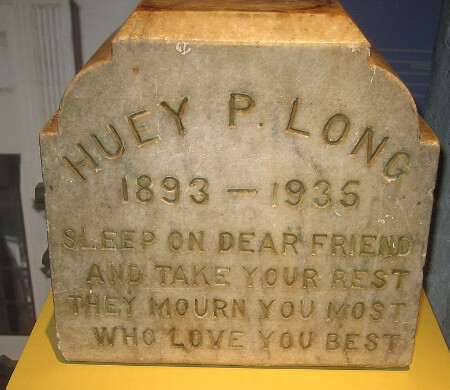
After World War II was concluded, Harry Truman was the target of an assassination plot by Puerto Rican Nationalists which also had some unfortunate fatal consequences. In 1963, Lee Harvey Oswald murdered President John F. Kennedy in Dallas Texas. Since that time, President Ronald Reagan was almost killed in an assassination attempt, and now former Republican President Donald Trump has been a target of a would-be presidential assassin, about whom we know little except that he was twenty years old and a registered Republican.
It was a horrible thing to have happened to those thousands of innocent people who were indulging their right to assemble at Saturday’s Trump Rally in Pennsylvania to hear the words of the man who they intend to support in his bid for presidential election on November 5, 2024. It is a very American thing to assemble to do this sort of thing in our open and free democracy, and nobody has the right to curb free speech and the right to support a political candidate for office by means of assassination regardless of one’s political persuasion. After almost two centuries of such political-gun violence in Presidential politics, we must evolve into a society of people who engage in civil debate, civil conversation, and a civil exchange of ideas in a democratic manner.
I realize that tempers can run hot in political confrontations. I confess that even I, at the age of 80, find myself to be somewhat too hot in my ill-tempered speech on occasion. It may not be we ourselves who may perpetrate acts of unseemly and dangerous violence born out of hostility, but what our ill-considered speech might incite others to act dangerously. I do not know what thoughts were passing through the mind of that twenty-year-old would-be assassin of Mr. Trump. But I think it a terrible failing of our society that a young man of twenty years, born about 2004, would take up a military grade quality semi-automatic firearm, and kill and wound people in an attempt to resolve what he regarded as political difficulties which should be properly resolved in the voting booth on November 5th. May sanity return to this poor country. We really seem to be in need of it.